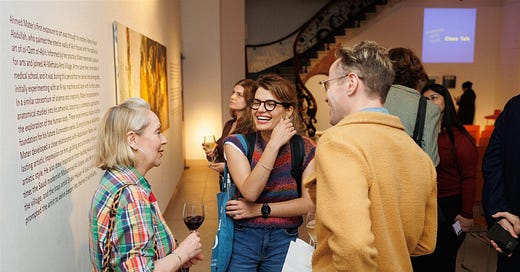I spend a lot of time on Reddit. This feels a little revealing to admit, although it’s come a long way from its edgier beginnings (which I was also there for). Reading other people’s thoughts, arguments, and problems has always been compelling for me as someone who is naturally curious.
A recent post in r/ContemporaryArt asked: What’s up with Contemporary Artists and Prominent Galleries Paying so Little? The responses were bleak. Commenters explained to the naive poster that it’s a feature, not a bug. The art world operates on low salaries to keep gatekeepers who work in the industry. On the surface, this feels counterintuitive—but just under the surface is the nefarious truth: Most people who can live on the laughably low wages in galleries and museums have family money to help them. No family money? You probably will need to find a job that pays a living wage.
Side note: The subject line of today’s newsletter is pulled from the Reddit thread above. Someone commented, “welcome to the entire history of art.”
Of course, this isn’t always the case. I don’t come from a fancy family or a trust fund, and I work in the arts full-time, as do many of my peers. The art world needs more economic diversity to truly become accessible. It’s another question if the art world writ large wants to be more accessible, but I want it to be! So I will continue to write on this subject.
One club in England is trying to change the status quo by providing a space for art workers who identify as working class to meet for events and networking opportunities. I love this idea, so I reached out to the founder of Working Arts Club, Meg Molloy, to ask some questions. Thank you to reader Shannon Viola, who put the club on my radar!
An interview with Meg Molloy of Working Arts Club
Art Forecast: What's your elevator pitch for Working Arts Club?
Meg Molloy: We are a network for working class people who are employed in the arts. That includes people who work for galleries, auction houses, PR companies, etc. We bring people together for events, networking opportunities and social occasions.
How do you define "working class"?
MM: I think a person's class is a very personal thing - it can be defined differently. Class might relate to how much money someone's family had while they were growing up, but it's complex. We're open minded about people having their own feelings on social positioning.
Can you describe your own trajectory in the art world?
MM: I studied fine art at university, art history was not on my radar at all - as it isn't for most state school kids! Once I graduated, I quickly felt as though a job in the arts wasn't achievable so I moved home and got a 'regular' job in a school. I fell into communications through my passion for writing in my spare time and after an internship and some freelance work, picked up enough experience to apply it to a gallery job. I've worked at institutions like Dulwich Picture Gallery, not-for-profits like Studio Voltaire and most recently in a commercial setting—Stephen Friedman Gallery—so I've tried quite a few different areas within the sector. The main thing I love about this industry is getting to work with amazing artists and being surrounded by art every day - it's great that I now get paid to write about it too!
What's a common sentiment that people who join the club have?
MM: I think that people join Working Arts Club because they think things need to change. The art world can be so isolating if you're from a lower socioeconomic background and many of our members have not felt heard, welcome or valued in our industry. People are part of this because they want to join a movement that improves the arts' overall accessibility.
The art world can be so isolating if you're from a lower socioeconomic background and many of our members have not felt heard, welcome or valued in our industry.
If you could change one thing about how the art world operates, what would it be?
MM: I would change recruitment processes. Employing the best people doesn't go hand in hand with who they know, or which university they went to. I think employers should open up the process of recruiting so that it's more accessible. The commercial art sector in particular can be quite private in how it recruits and I don't really see why.
A Rothko for only $1!
Speaking of MONEY, a reminder that great art doesn’t need to be expensive. Case in point: this Mark Rothko stamp. You can buy it for $20 cad here or $0.90 on hipstamp.com. A great stocking stuffer for the art (or stamp) lover in your life.






